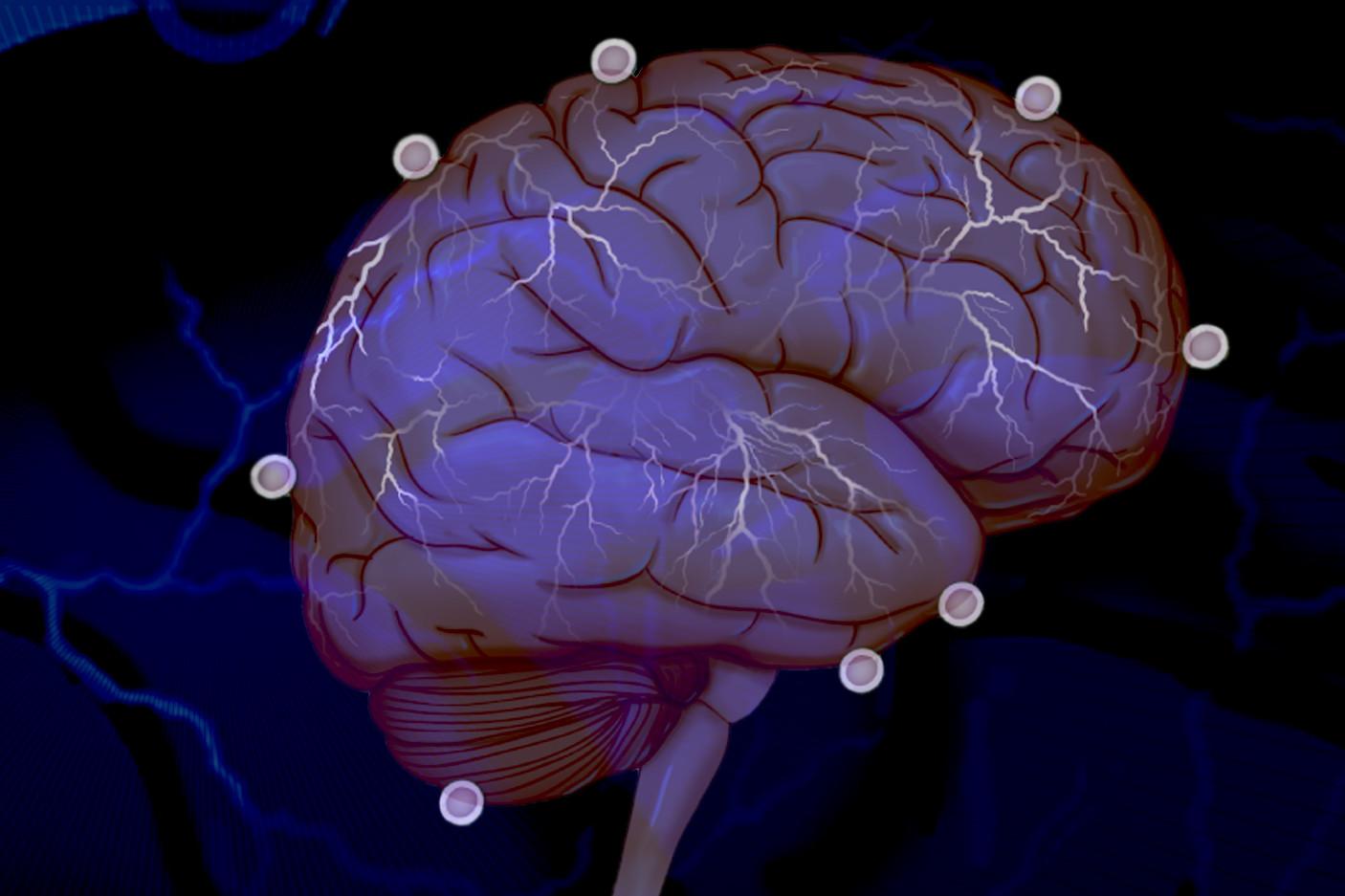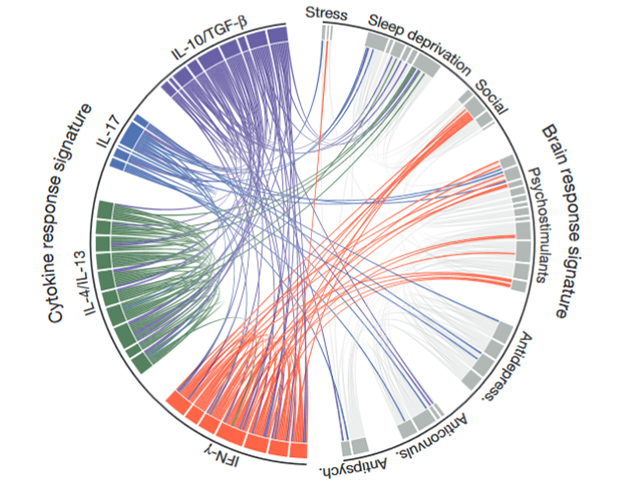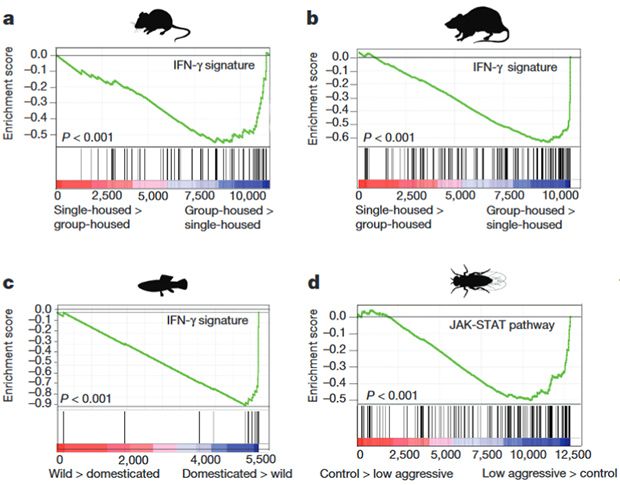Immunity as a regulator of social behavior
According to recent collaborative experiments conducted by researchers at the University of Virginia and Massachusetts lab, the immune system is directly involved in regulating neural connections and social behavior. A detailed report on the work done and the findings of scientists published in the pages of the journal Nature .

In their work, specialists used mice with a congenital severe combined immunodeficiency (affection of the system of acquired immunity). In the standard three-chamber test for socialization, such animals, unlike healthy ones, were interested in their relatives to the same extent as the surrounding inanimate objects. At the same time, mice practically did not show any manifestations of anxiety, motor or olfactory deficits.
The fMRI carried out at rest allowed us to identify in immunodeficient mice a sharply increased number of neural connections between multiple areas of the frontal cortex and islet gyrus responsible for social behavior. A very similar pattern is observed in animals with simulated social disorders and people with autism spectrum disorders.
')
At the age of four weeks, normal T lymphocytes were injected into immunodeficient mice. After another four weeks, such animals in the socialization test did not differ from healthy ones. Normalized in the relevant parts of the brain and neural connections.
The introduction of antibodies to integrin VLA4, which prevent T-lymphocytes from penetrating into the meninges, to healthy animals, on the contrary, caused them to be disturbed by “socialization”, similar to the behavior of immunodeficient mice.
To figure out exactly which T-lymphocyte-dependent signaling pathways (interferon-gamma, interleukins 4/13, 17, and 10, transforming growth factor beta) determine social behavior, scientists analyzed the representation of functional groups of genes (GSEA) in 41 of the cortical transcriptome brain rats and mice after the action of various stimulating factors, including social aggregation, sleep deprivation, stress, the introduction of psychostimulants, antidepressants, anticonvulsants and antipsychotic drugs. As it turned out, the expression of genes regulated by interferon-gamma is enhanced by social aggregation and admission of psychostimulants.

Relationship of cytokine expression with various stimuli. Anthony J. Filiano et al., Nature, 2016
In the course of further experiments, it was found out that in mice with a deficiency of this mediator of immunity, the same social disorders and disorders of neural connections are observed as in mice with immunodeficiency. The introduction of interferon-gamma into the cerebrospinal fluid made it possible to eliminate these disorders. In the course of research, scientists also managed to find out that the neurons of the prefrontal cortex express receptors for interferon-gamma, and the suppression of this expression leads to disorders of social behavior.
Experiments with freshly prepared samples of neurons showed that interferon-gamma suppresses neuronal activity by increasing the level of the inhibitory neurotransmitter GABA. This means that violations of socialization in immunodeficiency are the result of excessive activation of the cells of the prefrontal cortex.
Considering that interferon-gamma is one of the most important mediators of the immune response, scientists have suggested that its dual effect was the result of an evolutionary need to increase immunity when relatives appear in society, where pathogens are spreading intensively. To test the hypothesis, the researchers analyzed open access transcriptomes from various species, including rats, mice, zebrafish, and fruit flies. GSEA showed that in all these animals, being in a close community activates immune mechanisms even in the absence of infections, and isolation, on the contrary, leads to their suppression.

Connection of socialization and expression of cytokines in mice, rats, zebrafish and Drosophilus. Anthony J. Filiano et al., Nature, 2016
Thus, the experiments carried out and the results obtained made it possible to make an amazing conclusion: the immune system is an important regulator of social behavior, and a number of behavioral traits could well appear in the process of evolution as a result of the fight against immunity against infections. “It sounds crazy, but perhaps we are only multicellular battlefields of two ancient forces: pathogens and the immune system. A part of our personality can actually be under the control of immunity, ” explained work leader Jonathan Kipnis.
The results can significantly affect the understanding of the causes of autism spectrum disorders and schizophrenia, as well as the search for new ways and approaches to the treatment of these conditions.
A source
That's all with you was Dronk.Ru. Do not forget to return money for purchases in China and subscribe to our blog , there will be many more interesting things.

We recommend:
- Save up to 8% on every purchase on AliExpress and other online stores in China
- Why do online stores give money for purchases?
- Return your money - Choose a cashback service for Aliexpress
- The history of the development of Dronk.ru - from choosing quadcopters to returning money for purchases on AliExpress and not only
- The best cashback service or 5 main criteria for evaluating cashback service

In their work, specialists used mice with a congenital severe combined immunodeficiency (affection of the system of acquired immunity). In the standard three-chamber test for socialization, such animals, unlike healthy ones, were interested in their relatives to the same extent as the surrounding inanimate objects. At the same time, mice practically did not show any manifestations of anxiety, motor or olfactory deficits.
The fMRI carried out at rest allowed us to identify in immunodeficient mice a sharply increased number of neural connections between multiple areas of the frontal cortex and islet gyrus responsible for social behavior. A very similar pattern is observed in animals with simulated social disorders and people with autism spectrum disorders.
')
At the age of four weeks, normal T lymphocytes were injected into immunodeficient mice. After another four weeks, such animals in the socialization test did not differ from healthy ones. Normalized in the relevant parts of the brain and neural connections.
The introduction of antibodies to integrin VLA4, which prevent T-lymphocytes from penetrating into the meninges, to healthy animals, on the contrary, caused them to be disturbed by “socialization”, similar to the behavior of immunodeficient mice.
To figure out exactly which T-lymphocyte-dependent signaling pathways (interferon-gamma, interleukins 4/13, 17, and 10, transforming growth factor beta) determine social behavior, scientists analyzed the representation of functional groups of genes (GSEA) in 41 of the cortical transcriptome brain rats and mice after the action of various stimulating factors, including social aggregation, sleep deprivation, stress, the introduction of psychostimulants, antidepressants, anticonvulsants and antipsychotic drugs. As it turned out, the expression of genes regulated by interferon-gamma is enhanced by social aggregation and admission of psychostimulants.

Relationship of cytokine expression with various stimuli. Anthony J. Filiano et al., Nature, 2016
In the course of further experiments, it was found out that in mice with a deficiency of this mediator of immunity, the same social disorders and disorders of neural connections are observed as in mice with immunodeficiency. The introduction of interferon-gamma into the cerebrospinal fluid made it possible to eliminate these disorders. In the course of research, scientists also managed to find out that the neurons of the prefrontal cortex express receptors for interferon-gamma, and the suppression of this expression leads to disorders of social behavior.
Experiments with freshly prepared samples of neurons showed that interferon-gamma suppresses neuronal activity by increasing the level of the inhibitory neurotransmitter GABA. This means that violations of socialization in immunodeficiency are the result of excessive activation of the cells of the prefrontal cortex.
Considering that interferon-gamma is one of the most important mediators of the immune response, scientists have suggested that its dual effect was the result of an evolutionary need to increase immunity when relatives appear in society, where pathogens are spreading intensively. To test the hypothesis, the researchers analyzed open access transcriptomes from various species, including rats, mice, zebrafish, and fruit flies. GSEA showed that in all these animals, being in a close community activates immune mechanisms even in the absence of infections, and isolation, on the contrary, leads to their suppression.

Connection of socialization and expression of cytokines in mice, rats, zebrafish and Drosophilus. Anthony J. Filiano et al., Nature, 2016
Thus, the experiments carried out and the results obtained made it possible to make an amazing conclusion: the immune system is an important regulator of social behavior, and a number of behavioral traits could well appear in the process of evolution as a result of the fight against immunity against infections. “It sounds crazy, but perhaps we are only multicellular battlefields of two ancient forces: pathogens and the immune system. A part of our personality can actually be under the control of immunity, ” explained work leader Jonathan Kipnis.
The results can significantly affect the understanding of the causes of autism spectrum disorders and schizophrenia, as well as the search for new ways and approaches to the treatment of these conditions.
A source
That's all with you was Dronk.Ru. Do not forget to return money for purchases in China and subscribe to our blog , there will be many more interesting things.

We recommend:
- Save up to 8% on every purchase on AliExpress and other online stores in China
- Why do online stores give money for purchases?
- Return your money - Choose a cashback service for Aliexpress
- The history of the development of Dronk.ru - from choosing quadcopters to returning money for purchases on AliExpress and not only
- The best cashback service or 5 main criteria for evaluating cashback service
Source: https://habr.com/ru/post/395959/
All Articles